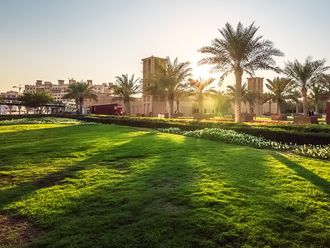Manama: Kuwait is anxious about instability in Iraq and disappointed at its neighbour’s failure to arrest a militia leader who said his group was behind a mortar attack on Saudi Arabia, a Kuwaiti intelligence chief said.
Shaikh Thamer Al Sabah, President of Kuwait’s National Security Bureau intelligence service, said in a rare interview that his working relationships with his counterparts in Iraq, which occupied Kuwait in 1990-91, and Iran needed improvement.
Kuwait, a small desert state sitting on 6 per cent of global oil reserves, is wedged uneasily between bigger regional powers Iraq, Iran and Saudi Arabia at the northern end of the Gulf.
Instability in any of the three unnerves Kuwait, possibly more than other small Gulf Arab states, thanks to the decision by then Iraqi leader Saddam Hussain to invade in August 1990.
A US-led coalition expelled Iraq seven months later, but the nation of 3.8 million took years to regain its confidence.
“We are deeply worried ... about the rapidly growing instability in Iraq,” Shaikh Thamer said on the sidelines of the Manama Dialogue, an annual Gulf security seminar.
“After all, Kuwait’s longest borders are with Iraq and any instability will have a direct and a profound impact on us.”
Two years after the departure of US troops, who invaded Iraq in 2003, Kuwait’s northern neighbour is again a war zone, with Sunni Muslim militants close to Al Qaida challenging the Shiite-led government. Shiite militias, which have no love for Saudi Arabia or Kuwait, also operate, but on a smaller scale.
Shaikh Thamer said he was “saddened” Iraq had not detained the leader of an Iranian-backed Iraqi Shiite militia who said his men fired mortar bombs that landed near a border post in northern Saudi Arabia on November 21. There were no casualties.
Wathiq Al Batat, commander of Iraq’s Al Mukhtar Army militia, said by phone the same day that the strike was a warning to the kingdom to stop meddling in Iraqi affairs.
Two days earlier suicide bombers had hit Iran’s embassy in Lebanon, killing 25 people. Some Shiite commentators saw a Saudi hand in the attack, although Riyadh condemned the bombing.
Shaikh Thamer said Al Batat had ties with other “terrorist organisations” in the region.
“However what saddens us the most is the Iraqi government’s reluctance to apprehend him and their shy condemnation of Wathiq Al Batat’s attacks,” he said.
Asked if Kuwait saw Al Batat as linked to Iran, Shaikh Tamer replied: “We are fully aware of his supporters and the people who instigated him to launch these attacks — he himself made it clear that these attacks are in retaliation for the Iranian embassy bombing in Beirut.”
Iraqi Interior Ministry spokesman Brigadier Saad Maan said Al Batat’s arrest had been ordered, but that he was on the run.
“We respect all brothers in Kuwait and all Arab countries and tell them that the Iraq of today is not like the Iraq of yesterday,” Maan said. “It is not possible that Iraq will be part of anything that may harm, or a place for launching any bullets toward the borders of our brothers.”
Security incidents in Saudi Arabia, Iran’s regional rival, stir bad memories in Kuwait, a close ally of the kingdom.
Bombings of US forces in Saudi Arabia by anti-Western militants in the mid-1990s reminded Kuwaitis of bombings in Kuwait against Western targets in the 1980s, a time when Iran and Iraq were fighting an eight-year war.
Kuwaitis blamed most of those on pro-Iranian Iraqi Shiites demanding the creation of an Islamic state in Iraq.
Asked about his regional counterparts, Shaikh Thamer said: “We enjoy excellent ties with our Saudi counterpart. In terms of Iraq and Iran, I think we have a long way to go.”
Shaikh Thamer said Kuwait welcomed a nuclear deal Iran struck with six world powers last month but suggested Tehran had to do more to win the trust of Gulf Arabs.
“We have been advocating such a deal with Iran and finally we see it coming through,” he said. “However Iran has other commitments to fulfil in order for it to gain trust and must embark on confidence-building measures with its neighbours.”
Some Gulf Arab states view Iran as a troublemaker in the region, seeking to build a nuclear bomb, politically dominant in Syria and Iraq and stirring subversion in Bahrain. Iran denies interference anywhere in the region and says its nuclear work is only for peaceful purposes.
The interim nuclear deal requires Tehran to limit uranium enrichment in return for an easing of international sanctions.











